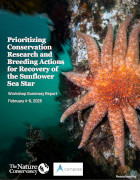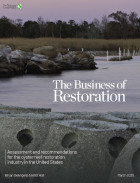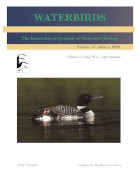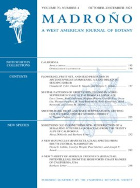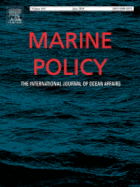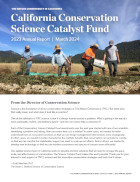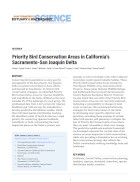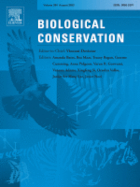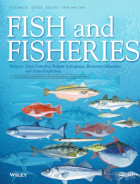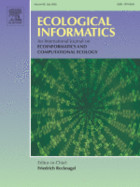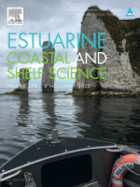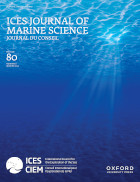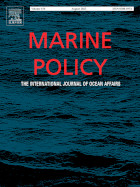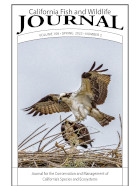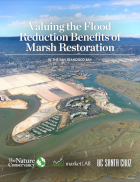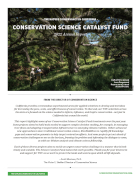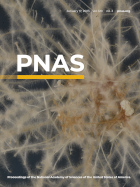Products
We identify issues and uncertainties that pose obstacles to conservation and then—in collaboration with internal and external colleagues—develop science products that help overcome those obstacles.
2026 | Freshwater | Terrestrial | Marine | Science | Publications & Reports
Oren Pollak Memorial Research Fund - 2026 RFP
The Oren Pollak Memorial Research Fund was established in 2000 in memory of Dr. Oren Pollak, a leading grassland ecologist and restoration pioneer, as well as an ardent champion and mentor for…2025 | Marine | Technology | Science | Publications & Reports
Ship collision risk threatens whales across the world’s oceans
Nisi A, H Welch, S Brodie, C Liephardt, R Rhodes, E Hazen, JV Redfern, TA Branch, A S Barreto, J Calambokidis, T Clavelle, L Dares, A de Vos, S Gero, J A. Jackson, RD Kenney, D Kroodsma, R Leaper, DJ McCauley, SE Moore, E Ovsyanikova, S Panigada, CV Robinson, T White, JR Wilson, B Abrahms
Collisions between whales and ships are a leading cause of death for threatened whale species across the globe. In this paper, scientists identified high risk areas for whale-ship collisions by…2025 | Marine | Science | Publications & Reports
Captive Breeding for Disease Resistance in the Sunflower Sea Star (Pycnopodia helianthoides)
The Nature Conservancy
In 2013, sea star wasting disease led to the collapse of sunflower sea stars (Pycnopodia helianthoides) along the west coast of North America. Animals are now being grown in captivity for eventual…2025 | Marine | Planning | Science | Publications & Reports
The Business of Restoration: Assessment and recommendations for the oyster reef restoration industry in the United States
Bryan DeAngelis, Elliot Hall
We must radically increase the pace, scale, and impact of restoration to recover the abundance, resilience, and benefits of coastal ecosystems. This project explored the current size of the…2025 | Marine | Planning | Science | Publications & Reports
The recovery of seabirds after an oil spill is limited by the presence of a non-native predator on their breeding island
Bixler, K., D. Roby, D.B. Irons, G.H. Golet
Seabirds are excellent indicators of the health of the world’s oceans. They are susceptible to marine pollution and dependent upon ecological processes that concentrate food in predictable…2024 | Terrestrial | Marine | Science | Publications & Reports
Spatial Patterns of Vegetation Change in a Fire-Suppressed Coastal California Landscape
Lucy Genua, Brad Anderson, Meghan Bowen, Genelle Ives, Owen Liu, Thomas Paschos, H. Scott Butterfield, Kelly Easterday, Mark Reynolds, James H. Thorne
In this paper, the authors used historical vegetation data, from both aerial photographs and field transects, to assess the change in major vegetation types at the Dangermond Preserve over the last…2024 | Marine | Science | Publications & Reports
Advancing fisheries sustainability and access through community fisheries trusts
Kate Kauer, Lyall Bellquist, Jenn Humberstone, Vienna Saccomanno, Dwayne Oberhoff, Sherry Flumerfelt, Mary Gleason
This 2024 paper by TNC staff and partners represents the first U.S.-wide synthesis of fisheries trusts – which are community-based entities that acquire and manage fishery privileges with the…2024 | Freshwater | Terrestrial | Marine | Science | Publications & Reports
Conservation Science Catalyst Fund - 2023 Annual Report
The Nature Conservancy deploys science to help overcome major challenges facing people and nature. In today’s fast-paced world, turning threats to nature into opportunities for conservation…2023 | Freshwater | Terrestrial | Marine | Planning | Science | Publications & Reports
Prioritizing Bird Conservation Areas in the Sacramento-San Joaquin River Delta
Kristen E. Dybala, Kristin. A. Sesser, Matthew E. Reiter, W. David Shuford, Gregory. H. Golet, Catherine Hickey, and Thomas Gardali
Conserving birds is a key goal for management of the Sacramento–San Joaquin Delta ecosystem, one of the largest estuaries on the Pacific Coast, and is likely to have effects for populations well…2023 | Marine | Science | Publications & Reports
Static management presents a simple solution to a dynamic fishery and conservation challenge
Christopher M. Free, Lyall F. Bellquist, Karin A. Forney, Jenn Humberstone, Kate Kauer, Qui Lee, Owen R. Liu, Jameal F. Samhouri, Jono R. Wilson, Darcy Bradley
Dynamic ocean management frameworks can be a useful approach to fisheries management under climate change. In the oceans, marine heatwaves are increasingly common symptoms of climate change that can…2023 | Marine | Science | Publications & Reports
Characterizing state-managed and unmanaged fisheries in coastal marine states and territories of the United States
Michael C. Melnychuk, Charmane E. Ashbrook, Richard J. Bell, Lyall Bellquist, Kate Kauer, Jono R. Wilson, Ray Hilborn, Jay Odell
America’s fisheries provide nearly two million jobs and contribute $117 billion to the national GDP. Although state and territory fisheries account for 40% of the commercial value of U.S. marine…2023 | Marine | Technology | Science | Publications & Reports
The CALFISH database: A century of California's non-confidential fisheries landings and participation data
Christopher M. Free, Camila Vargas Poulsen, Lyall F. Bellquist, Sophia N. Wassermann, Kiva L. Oken
Commercial and recreational fisheries in California influence a long and dynamic history of coastal economies, cultural heritage, and marine ecosystem health. Fisheries-dependent data sources are…2023 | Marine | Science | Publications & Reports
Use of management strategy evaluation to understand the value of citizen science in managing an iconic California recreational fishery
Lyall Bellquist, William J. Harford, Frank Hurd, Alexis Jackson, Jeremy D. Prince, Jan Freiwald, Anna Neumann, Jack Likins, Jono Wilson
Conventional fisheries management relies largely on professional sources of scientific data collection, typically from academic or government institutions. Development of community-led data sources…2023 | Marine | Science | Publications & Reports
Post-release survival and prolonged sublethal effects of capture and barotrauma on deep-dwelling rockfishes (genus Sebastes): implications for fish management and conservation
Nicholas C. Wegner, Elan J. Portner, Drew T. Nguyen, Lyall Bellquist, Andrew P. Nosal, Alena L. Pribyl, Kevin L. Stierhoff, Paul Fischer, Ken Franke, Russell D. Vetter, Philip A. Hastings, Brice X. Semmens, and John R. Hyde
Historical overfishing led to depletion of several groundfish species on the US west coast. Two of these species, Cowcod and Bocaccio, heavily influenced the expansion of groundfish regulations to…2023 | Marine | Science | Publications & Reports
Impact of the 2014–2016 marine heatwave on US and Canada West Coast fisheries: Surprises and lessons from key case studies
Christopher M. Free, Sean C. Anderson, Elizabeth A. Hellmers, Barbara A. Muhling, Michael O. Navarro, Kate Richerson, Lauren A. Rogers, William H. Satterthwaite, Andrew R. Thompson, Jenn M. Burt, Steven D. Gaines, Kristin N. Marshall, J. Wilson White, Lyall F. Bellquist
As symptoms of climate change, extreme environmental events (e.g., marine heatwaves) now represent the greatest global threat to the oceans, causing profound ecosystem and socioeconomic impacts. The…2023 | Marine | Planning | Science | Publications & Reports
U.S. exempted fishing permits: Role, value, and lessons learned for adaptive fisheries management
Lindsay Bonito, Lyall Bellquist, Alexis M. Jackson, Kate Kauer, Mary G. Gleason, Jono Wilson, Stuart Sandin
Experimentation supports adaptive and climate-ready fisheries management in numerous contexts. Exempted Fishing Permits (EFPs) enable fisheries participants, scientists, and managers to…2023 | Marine | Science | Publications & Reports
Characterization of a developing recreational deep-drop fishery for swordfish off southern California
Scott A. Aalbers, Michael Wang, Lyall Bellquist, Kate Kauer, Alexis Jackson, Chugey A. Sepulveda
An emerging recreational fishery for swordfish has recently developed in California, outpacing existing fisheries monitoring programs, which prevents accurate estimation of swordfish catch and effort…2023 | Freshwater | Terrestrial | Marine | Planning | Publications & Reports
Valuing the Flood Reduction Benefits of Marsh Restoration
Taylor-Burns, R., Heard, S., Beck, M. W.
There is growing evidence for the beneficial role that wetlands can play in reducing flood risk, but in many urban estuaries, coastal development has resulted in dramatic habitat loss and…2023 | Freshwater | Terrestrial | Marine | Science | Publications & Reports
Conservation Science Catalyst Fund - 2022 Annual Report
The Nature Conservancy deploys science to help overcome major challenges facing people and nature. In today’s fast-paced world, turning threats to nature into opportunities for conservation…2023 | Terrestrial | Marine | Technology | Science | Publications & Reports
Minimizing conservation impacts of net zero energy systems in the western United States
Grace C. Wu, Ryan A. Jones, Emily Leslie, James H. Williams, Andrew Pascale, Erica Brand, Sophie Parker, Brian Cohen, Joseph Fargione, Julia Souder, Maya Batres, Mary G. Gleason, Michael H. Schindel, Charlotte K. Stanley
This paper presents the results of the Power of Place-West project. The authors combined energy modeling with ecosystem and wildlife habitat data to determine the costs and impacts associated with…
